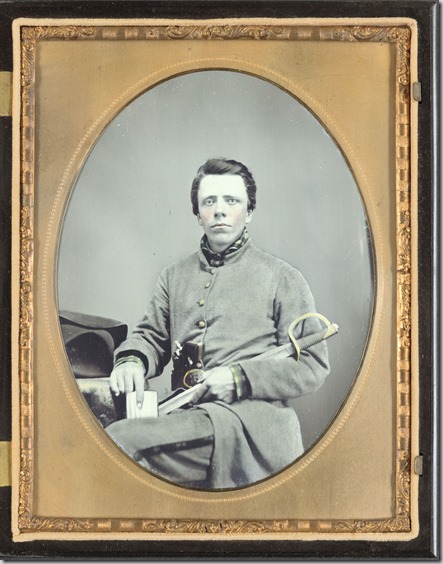13th May (Wednesday).—There was a row on board last night; one of the officers having been too attentive to a lady, had to skedaddle suddenly into the woods, in order to escape the fury of her protector, and he has not thought it advisable to reappear. My trusty companion for several days, the poor young Missourian, was taken ill to-day, and told me lie had a “right smart little fever on him.” I doctored him with some of the physic which Mr Maloney had given me, and he got better in the evening.
We had pickets out in the woods last night. Two of my fellow-travellers on that duty fell in with a negro, and pretending they were Yankees, asked him to join them. He consented, and even volunteered to steal his master’s horses; and he then received a tremendous thrashing, administered by the two soldiers with their ramrods.
At 9 P.M., to the surprise of all, the captain suddenly made up his mind to descend the river at all hazards, thinking, I suppose, that anything was better than the uncertainty of the last twenty-four hours.
The further we went, the more beautiful was the scenery.
At 4 P.M. we were assured by a citizen on the bank that the gunboats really had retreated; and at 5.30 our doubts were set at rest, to our great satisfaction, by descrying the Confederate flag flying from Fort Beauregard, high above the little town of Harrisonburg. After we had landed, I presented my letter of introduction from General Hebert to Colonel Logan, who commands the fort. He introduced me to a German officer, the engineer.
They gave me an account of the attack and repulse of the four Federal gunboats under Commodore Woodford, and supposed to have been the Pittsburg (ironclad), the General Price, the Arizona, and another.
Fort Beauregard is a much more formidable looking work than I expected to see, and its strength had evidently been much underrated at Munroe.
A hill 190 feet high, which rises just in rear of Harrisonburg, has been scarped and fortified. It is situated at an angle of the river, and faces a long “reach” of two miles.
The gunboats, after demanding an unconditional surrender, which was treated with great contempt by Colonel Logan, opened fire at 2 P.M. on Sunday, and kept it up till 6.30, throwing about one hundred and fifty 9 and 11 inch shell. The gunboats reopened again for about an hour on Monday afternoon, when they finally withdrew, the Arizona being crippled.
The fort fired altogether about forty-five 32-pound shot (smooth bore.) The range was about a mile.
The garrison thought that they had loosened several of the Pittsburg’s iron-plates. They felt confident they could have sunk the wooden vessels if they had attempted to force the passage; and they were naturally much elated with their success, which certainly had not been anticipated on board my steamer, or at Munroe.
I had not time to visit the interior of the fort, but I saw the effect of the shell upon the outside. Those which fell in the sand did not burst. Only three men were wounded in the garrison. They told me the deck of the Pittsburg was furnished with a parapet of cotton bales for riflemen.
The river at Harrisonburg is about 160 yards broad, and very deep, with a moderate current. The town, being between the vessels and the fort, had, of course, suffered considerably during the bombardment.
When the works are complete they will be much more formidable.
To our great joy Colonel Logan decided that our vessel should proceed at once to Trinity, which is fifteen miles nearer Natchez (on the Mississippi) than Harrisonburg.
We arrived there at 8 P.M., and found that the gunboats had only just left, after having destroyed all the molasses and rum they could find, and carried away a few negroes.
Six of us pigged in one very small room, paying a dollar each for this luxury to an old woman, who was most inhospitable, and told us “she didn’t want to see no soldiers, as the Yanks would come back and burn her house for harbouring rebels.” I am always taken for a Confederate officer, partly from being in their company, and partly on account of my clothes, which happen to he a grey shooting-suit, almost the same colour as most of the soldiers’ coats.












